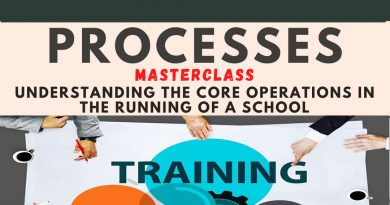ACADEMIC QUALITY – The School Business Success Equation – Parameter 3
The most interesting part of my job as a School Business Strategist is visiting schools, talking to school owners, finding out what their problems are, meeting the teachers and solving issues.
When you ask the average school what they do best and what (in their own opinion) makes them stand out, the first response you get is: ACADEMIC QUALITY. This response is just like hearing a coloured TV say that its strength is to show coloured pictures.
But then I decided not to take their word for it. We know you’re trying your best, but these wonderful children in your care deserve, perhaps, more than 100% of what you’re giving them now. They deserve all of the quality academics they need…, to have an enviable future. This should be your burning desire, irrespective of how much or less their parents are paying you or owing you.
Here’s what I mean!
It’s pretty easy to excuse ourselves of the underlying responsibility of delivering that quality education at all costs due to known challenges of making sure we make ends meet and make profit to sustain our school business, but as a school, you have to decide for yourself which one comes first – ensuring quality or protecting business.
The first and most important task for the school owner (which of course is default) is to assure quality education and put it first in spite of the uncertainties that surround the edu-business atmosphere and the need to cut costs here and there. The alternative to that perhaps is to look for something else to do.
As usual, this topic will be broken down into 4 parts. Please make sure you follow all. The topic is indeed loaded.
- What Is Academic Quality?
- What Are Your Teachers Teaching?
- What Are Your Children Learning?
- How To Boost Your Parents’ Assessment and Impression About Your Quality Delivery
1. WHAT IS QUALITY EDUCATION?
Now, every school claims their strength is in Academic Quality! It then begs the question: Are we really delivering on that mandate? Again, I think I have the answer to that:
I don’t know how much attention you pay to the details of what your teachers teach and their methods of delivery. How about the quality of what your students are actually learning? What are your parents’ assessment of your services?
Quite daunting, you may be thinking – Does Mr Adeniji Really want to answer this question? Or maybe I should reframe the question to something like –
WHAT IS QUALITY ACADEMICS IN THE CONTEXT OF SCHOOL BUSINESS as it were?
Simply put, good education is one that equips learners on the path of life-long learning and relevance. Although it goes beyond the accumulation of facts and the acquisition of skills, it only begins with it. We’re actually helping the children learn how to learn. A good education is not an end in itself … a good education is but a starting point and that’s exactly what we as school owners have sworn to deliver to our parents. And here is where it begins…
2. WHAT EXACTLY ARE YOUR TEACHERS TEACHING? ARE YOU SURE IT’S QUALITY?
Is it true that the quality of teachers we employ depend on their price or certificates? If it is, then what’s the fate of schools who don’t charge much? Let me answer both questions.
1. If you’d not be able to guarantee your parents and your children quality because you think they’re not paying much, then you can not be said to be obedient to your calling. You need to either redefine your role in the whole education value chain or submit yourself to further learning as the case may be.
2. If your fees are too low to afford the children quality teachers, please you need to increase the fees and trim down on the children and also teachers needed. OR sought for grants for other external means to achieve this calling. Anything worth doing at all is worth doing well.
3. If you’re in the business of school with the primary drive of making ends meet or making money, then you may begin to think of other businesses as well because believe me, school, especially when it’s not yet fully grown, is not the biggest money spinner.
4. That finally leads me to answering the question of WHAT ARE YOUR TEACHERS TEACHING? If you’ve appropriately settled items (1) to (3) within yourself, you now need to design a mechanism to assert the level of quality your teachers are delivering. Please don’t take their word for it and don’t be fooled by the purported experience and qualification because, I’m sorry, but:
TEACHERS DON’T DO WHAT YOU EXPECT, THEY ACTUALLY DO WHAT YOU INSPECT
So, inspect and inspect unapologetically.
Teaching may be taking place while learning is not. Activity is not tantamount to results. Please don’t be too relaxed, check continuously. Pay attention to QUALITY. I think The primary task for the school owner is to assure quality and put it first in spite of the uncertainties that surround the edu-business atmosphere and the need to cut costs here and there. Again, the alternative to that perhaps is to look for something else to do.
OK, I CAN’T AFFORD QUALITY TEACHERS, BUT I STILL HAVE TO DO BUSINESS
The question is – who really are quality teachers? Those who have NCE or BEd or MEd as the case may be? Or those who are so experienced they can double as the school owner? The answer may be both, and could be none of the above.
A quality teacher is one who has over time developed enough PATIENCE & RESOLVE to see children successful through whatever level or stage they find them by imparting them sufficiently enough to get them flying at that stage, presenting them confidently to the next stage – even ins spite of the uncertainties surrounding their vocation as a teacher. Conditions such as pay or personal pursuits. So how many of such do you have in your school?
Truth is, these kind of teachers are gradually being hard to find, not expensive, but simply not available in plenty. Here’s what I advice: Know your onions. Build your own structure. Money or no money, it begins with you.
Parents may be engaged in line with your laid down rules, but are they getting a treatment they’ll hardly find better elsewhere? Again the difference is in your preference for QUALITY and your efforts at surpassing your present rating.
3. WHAT ARE YOUR CHILDREN LEARNING?
I have always maintained that activity is not tantamount to results. Every school owner is like a trade master with teachers and students as her apprentices. Yes your teachers may be seen to be doing the best they can, but that doesn’t necessarily translate into measurable learning on the children.
What children learn in school is far more than academics. But academics is the only thing we measure. Interestingly, children who come out brilliant have also learnt other things from their teachers, and school owners apart from academics.
Brilliance cannot be achieved by focusing on academics alone. A teacher with poor handwriting, apart from raising children whose handwriting will also be poor, may only have few children with self-consciousness and self-organization in their class.
Because if you check out teachers who don’t care about their handwriting before students, they may actually not care about several things also – dressing, appearance, coordication, attention to detail, etc. Children with good handwriting are known to be conscious of how their actions are perceived by others. They may not be coming tops in class now, but watch out for them in future. A little bit of psychology you would say, but then, let’s even return to academics which is our primary assignment.
Quality Assurance
I’ve once taught in a school where we a department called Quality Assurance. Now, the ministry of education has that department, but many schools don’t deem it fit to set up such in their respective schools. In that school I’m talking about, the quality assurance department checks through the lines of every students notebooks and make sure they are fit for presentation to parents and guardians. Students are called at random to defend what is written in their books to be sure the teacher didn’t just make them copy notes.
Now you may say that is the job of the teacher, but can you also sincerely say that the teacher’s routine allows her to verify how much her students are learning. If it is, then do they go that extra mile?
Let me also add that every academic staff in the school can be teachers, but everyone may not necessarily have to teach. Some can be designated primarily to assure the quality of what the others are teaching.
You see we don’t have to wait for the results of external examinations to measure the delivery of our teachers or what has been learnt by the students. I know this is easier in the nursery, primary and junior secondary sections than it is for senior secondary, yet, I think we should pay closer attention to what the children are learning in the school generally and not just put pressure on the teachers to exhaust their lesson plans and syllabuses.
There’s one particular act I want us to correct. Hipping so much work pressure on teachers to teach everything listed in the lesson plans at the expense of assuring this quality of the children are actually learning. I walk into many schools and teachers have been baked to act more or less like robots. You hardly feel that flare and freedom to create. Original enthusiasm is rapidly fading off fron today’s school environment. The kind of enthusiasm I grew up into, day in day out as my mother transported me and my siblings to the same school where she taught – though many years back now, but that’s how the school environment should be. A place of freedom!
Teachers are wonderful beings who’re still super-enthusiastic even though they know that a huge fraction of their reward is in heaven. Please don’t remove this enthusiasm with too much pressure. If you do, the effect will be negative on the children. They will be teaching, but the children will not be learning. Remember, teaching is partly spiritual. Students learn who their teachers are, not just what they teach
HOW TO BOOST YOUR PARENTS ASSESSMENT AND IMPRESSION ABOUT YOUR SCHOOL’S QUALITY DELIVERY
I taught you in the last class that business and its marketing are not primarily about the product or service, but about connecting on an emotional level with the customer for whom the product/service is meant. Many schools fail to keep their parents because they’ve not learnt to communicate their quality delivery effectively to the parents, not really because they’re not performing well.
A product or service will be tagged as unsatisfactory as long as the customer says so, even if the service provider thinks otherwise. So your school is great only to the extent that your parent acknowledge that, irrespective of how much effort you’re putting into it or how much pressure you’ve piled on your teachers. So here’s the point I’m making. Let there be no disconnect between what you’re doing and what the parents perceive you’re doing.
Let it not be that your parents do not even know or see the extra mike you’re going with their Kid’s. You may be cheating yourself if your activities are not well sold to the parents or some of your staff are de-marketing you through bad attitude.
FOR EXAMPLE – HOMEWORK
Children’s Homework Is A Major Tool For Parents’ Assessment Of Your School’s Delivery.
This assessment to is not enough to rate your academic quality as great, but for many of your parents, this is what they see.
Unfortunately, these days, 70% of the homework or assignments children take home have to be done by their parents or elder siblings, if the children must score well in them. That shouldn’t be. It doesn’t market your school well. It makes you as a school lose value before the parents. Or what is the essence of schooling my child if I must always do the child’s home work for him or her.
Now, I’m not talking about babies here. And don’t get me wrong, parents must guide their children through homework, but when children are never independent with their homework, it de-markets the school. It makes it look as if the teachers have not done their jobs. And really, maybe they haven’t. Homework should not be given just to keep children busy or fill up their time and make leisure impossible for they or their parents. Homework should be exercises they have been taught (or introduced to) in school and they need to practice more at home for more perfection.
FOR THE SAKE OF BUSINESS: Please stop Introducing new topics to children as homework, and stop giving children homework they have no idea of. Also stop overloading children with too much homework. Before you give homework, be sure the children can solve the tasks, maybe not completely independently, but with only little.
Another Tool For Boosting Parents’ Assessment and Impression Of Your School’s Delivery Are The Visiting Days.
Here, I’m talking about Open Days, Visiting Days, Event days, and PTA/PTF/PAP days. In essence, Those days when you receive parents in your school for one occasion or one event or the other. The events, activities, interactions and the level of access granted to parents on such days must be meticulously premeditated and pre-planned. Nothing must be left to chance at all. If there will be presentations either from you or teachers or from the children, they must be well thought-through and rehearsed. Make sure you’re always putting your best feet forward. Everyone, especially teachers must be in their best attitudes and carry themselves with utmost confidence.
For a moment, let me put you in the shoes of the parents. Now, school owners and teachers find this hard to model this, because even though we’re all parents, we’re always in school with the children. Parents pay school fees with faith – believing that you will deliver. If you don’t, money will not be refunded for that term. Instead, more will be paid next term. So when you invite them, they’re just eager to have a feel of what their children are given in school. Hence, the need for you to make that experience memorable. When they come, you must always thrill them with the texture of your academic quality.
This certainly is a major parameter in the success equation of your school



